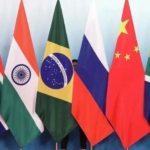
As leaders gather in Johannesburg for the 15th BRICS summit, the world is abuzz about the potential for a seismic shift in global geopolitics. BRICS is likely to challenge the long-standing US hegemony and contribute to reshaping the global order. The grouping of the world economies of Brazil, Russia, India, China and South Africa embodies a unique convergence of geographically diverse nations, each possessing substantial economic and geopolitical influence.
It represents over 40 percent of the global population and nearly a quarter of the world’s GDP, wields significant clout in the international arena. By coming together, these nations can present a unified front on critical issues, ranging from climate change and economic development to substantial growth and technology innovation.
South African President Cyril Ramaphosa said the five BRICS nations are open to expanding the club to new members as it pursues greater clout in shaping the world order. “BRICS nations need to advance the interests of the global south and call for industrialized countries to honor their commitments to support climate actions by developing economic progress.”
Chinese President Xi Jinping also called for an expansion of the BRICS grouping of emerging economies. He highlighted the need to build a more just and equitable international order, and said hegemonism is not in China’s DNA. “China stands firmly on the right side of history and believes a just cause should be pursued for the common good. Right now, changes in the world, in our times, and in history are unfolding in ways like never before, bringing human society to a critical juncture.”
Keep Reading
A Challenge for US
For decades, the US has held a dominant position in global politics, shaping international policies and institutions to align its interests. The BRICS summit sends a clear message that alternative power centers are emerging, diluting the overwhelming influence the United States has traditionally wielded. As BRICS nations assert their economic and political strength, they are gradually eroding the unipolar world order, driving towards a more balanced distribution of power.
BRICS serves as a platform to discuss reforms to international institutions, advocating for a more representation global governance structure. Calls for an expanded UN Security Council membership and changes in the voting rights within the International Monetary Fund reflect the bloc’s commitment to a fairer distribution of decision-making power.
While the BRICS nations exhibit immense potential, they also face internal and external challenges. Economic disparities among member states, divergent political systems, and varying strategic interests can sometimes hinder cohesive action. Moreover, external pressures from established powers reluctant to cede influence can strain the group’s efforts. But these challenges do not eclipse the opportunities that a collective BRICS endeavor presents.
Furthermore, BRICS present an alternative narrative to the prevailing US-centric world order. While a complete overhaul of the global system is not imminent, the gradual erosion of the hegemony is evident. BRICS offers a vision of a multipolar world where emerging economies play a pivotal role in shaping international policies.


























